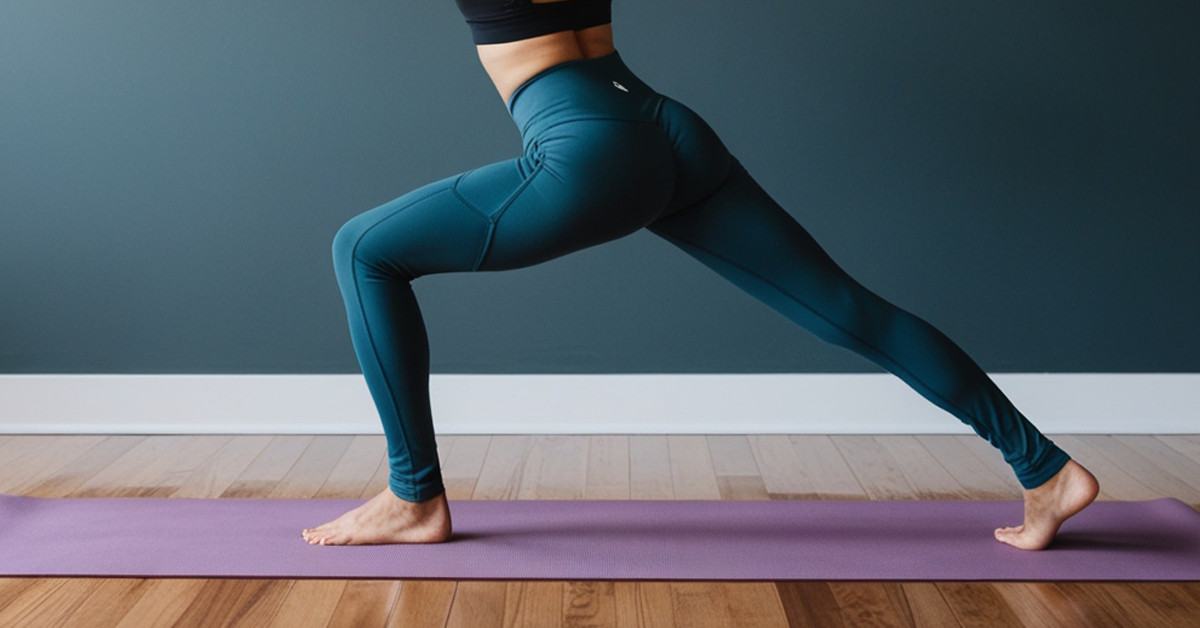Listen to a summary of this article:
Key Takeaway
Yoga pants, first designed by lululemon in 1998, evolved through five innovative stages.
Yoga pants have become more than just workout gear – they’re a cultural icon! Can you believe that these stretchy, comfortable bottoms we now wear everywhere didn’t always exist? Want to know who invented yoga pants?
The invention of yoga pants has transformed how women wear yoga pants as part of their everyday casual wear. Did you know that global activewear sales are projected to reach billions in 2024? From ancient yoga practices to modern street style, yoga pants have undergone an incredible transformation that’s revolutionized how we dress, exercise, and express ourselves!
Contents
The Origins of Yoga Clothing: Before Yoga Pants Existed
Let’s talk about workout clothes – and trust me, they used to be awful!
In India, yoga practitioners used to wear loose, flowing clothes. These were great for spiritual practice but terrible for actual movement. Imagine trying to do a tough pose while your clothes keep bunching up! It was like wrestling with your outfit while trying to find inner peace.
Yoga needed clothing that could move. Athletes and yoga lovers wanted something that worked with their body, not against it, leading to the invention of yoga pants that are typically worn for yoga. These early clothing problems sparked an amazing journey – the invention of yoga pants!
The Invention of Yoga Pants: A Material Revolution
Get ready for an awesome story about spandex!
Joseph Shivers, an American chemist, changed everything with one incredible invention. Before spandex, stretchy workout clothes were just a dream. Suddenly, clothes could stretch, move, and snap back to their original shape, making yoga pants made for comfort and style.
I’ll never forget trying on my first spandex-blend leggings. My legs could finally breathe! Tight yoga pants weren’t just cool – they became a must-have. You could go from yoga class to grabbing coffee without feeling sweaty and uncomfortable.
This was more than just clothing; yoga pants made a statement about comfort and flexibility in everyday fashion. It was a total game-changer for how we think about moving and feeling good. And yoga pants quickly became popular.
lululemon and Chip Wilson: Transforming Activewear
Let’s talk about Chip Wilson and lululemon – the brand that made yoga pants super popular!
When I first heard about $100 yoga pants, I thought people were crazy. But then I tried them on, and wow – I got it! Wilson saw something most missed: women wanted workout clothes that actually fit their bodies. Before lululemon, women’s workout clothes were just tiny versions of men’s clothing. Boring and totally impractical.
In the early 2000s, lululemon’s yoga pants showed up everywhere. Suddenly, workout clothing wasn’t just about function – it was a fashion statement! Women found these pants and felt like they’d discovered something amazing. Comfortable, stylish, and you could wear them anywhere. Check out the current best selling yoga pant.

lululemon Align™ High-Rise Pant
The Rise of Yoga Pants in Fashion and Functionality
Here’s a secret: yoga pants aren’t just for yoga anymore!
I’ve worn mine to work, the grocery store, on flights – basically everywhere. What started as specific clothing for yoga lovers quickly became a fashion must-have. We all want comfort without giving up style, right? You must be wondering how they can be worn to work, check out our article on how to wear yoga pants to work.
Moisture-wicking fabrics and designs that actually fit women’s bodies changed everything. Yoga pants became more than just leggings – they became a way to express yourself.
In recent years, yoga pants have transcended their humble origins as a staple of workout attire and have become a significant player in the fashion world. Initially designed for comfort and flexibility during yoga practice, these versatile garments have evolved into a multifaceted wardrobe essential.
This transformation can be attributed to several key factors: the growing emphasis on health and wellness, the influence of athleisure trends, and the relentless pursuit of comfort in everyday clothing.
The Health and Wellness Movement
As society becomes increasingly health-conscious, the popularity of activities such as yoga, pilates, and fitness classes has soared. This cultural shift has sparked a demand for apparel that not only supports physical activity but also allows for ease of movement and breathability. Yoga pants, often made from high-performance materials that wick moisture and provide stretch, have become synonymous with this lifestyle. They embody a blend of practicality and style, appealing to both fitness enthusiasts and those who prioritize comfort in their daily lives.
The Athleisure Trend: Modern Yoga Pants
The rise of the athleisure trend has further propelled yoga pants into the fashion limelight. Athleisure—a blend of athletic and leisurewear—has redefined how we view casual attire. Designers and brands have embraced this trend, creating stylish yoga pants that seamlessly transition from the gym to the coffee shop or even the office, making them a popular choice for women.
With innovative designs, bold colors, and trendy patterns, yoga pants are no longer just functional; they have become a fashion statement. This shift has been supported by influencers and celebrities who frequently wear yoga pants in various settings, further normalizing their use beyond athletic contexts.
Comfort as a Priority: A Fashion Statement
In a world where comfort is often prioritized, yoga pants have found a permanent place in people’s wardrobes. The COVID-19 pandemic accelerated this trend, as many individuals sought comfort while working from home. As sweatpants and loungewear became the new norm, yoga pants offered a middle ground—providing the comfort of lounge clothing while maintaining a polished look. The versatility of yoga pants allows them to be dressed up with blazers and boots or paired with cozy sweaters and sneakers, making them suitable for a variety of occasions.
Sustainability and Innovation
The fashion industry has significantly evolved with the rise of yoga pants as a staple in everyday casual wear. With an increased focus on sustainability, many brands are now producing yoga pants from eco-friendly materials. This shift not only appeals to environmentally conscious consumers but also sets a new standard for functional fashion.
Innovations in fabric technology have led to the development of sustainable materials that offer the same benefits as traditional synthetic fabrics, such as durability and moisture-wicking properties, without harming the planet.
The rise of yoga pants in both fashion and functionality is a testament to the evolving landscape of modern apparel. As they continue to blend comfort, style, and practicality, yoga pants will likely remain a staple in wardrobes worldwide.
Global Impact and Fashion Trends
Who would’ve thought yoga pants would become a worldwide phenomenon?
From small yoga studios to big fashion runways, these pants have taken over. The activewear market exploded, with yoga pants leading the way. Brands keep creating pants that work for workouts and hanging out with friends.
Yoga pants are more than clothing. They represent comfort, flexibility, and breaking old fashion rules. They’re not just pants – they’re a movement! Explore the popular types of yoga pants.
The intersection of global impact and fashion trends has never been more pronounced than in today’s interconnected world. As consumers become increasingly aware of the social, environmental, and economic implications of their purchasing decisions, the fashion industry finds itself at a pivotal crossroads.
Sustainable Practices
One of the most significant shifts in fashion trends is the movement towards sustainability. Brands now prioritize eco-friendly materials, ethical labor practices, and transparent supply chains. Consumers are more inclined to support brands that demonstrate a commitment to sustainability, leading to a rise in the popularity of organic cotton, recycled fabrics, and innovative materials such as Tencel and vegan leather.
This trend caters to the growing demand for sustainable products while addressing pressing global issues like climate change and resource depletion.
Cultural Inclusivity
Fashion is increasingly reflecting a broader range of cultural influences. Designers draw inspiration from diverse traditions and aesthetics, leading to a richer tapestry of styles celebrating global heritage. This cultural inclusivity is not only a response to consumer demand for representation but also a recognition of the fashion industry’s role in shaping societal narratives.
Collaborations between Western brands and artisans from different cultures have become more common, promoting fair trade and ensuring local communities benefit from their art and craftsmanship.
Digital Transformation
The digital revolution has fundamentally altered the fashion landscape. Social media platforms and e-commerce have allowed brands to reach wider audiences while also facilitating faster trend cycles. Influencers play a significant role in shaping consumer preferences, often promoting brands that align with their values, including sustainability and social justice.
Moreover, the rise of virtual fashion and augmented reality is redefining how consumers engage with fashion, allowing for immersive experiences that transcend traditional shopping.
Circular Fashion
Another emerging trend is the concept of circular fashion, which emphasizes the importance of reducing waste and extending the lifecycle of clothing. Brands are adopting take-back programs, promoting second-hand shopping, and utilizing upcycling techniques to create new garments from old ones. This shift minimizes environmental impact and encourages consumers to rethink their relationship with clothing, fostering a more sustainable mindset.
As the global landscape continues to evolve, so too will the fashion trends that reflect and respond to these changes. The industry’s ability to adapt to consumer demands for sustainability, inclusivity, and technological innovation will determine its future trajectory.
By embracing these values, fashion can become a powerful force for positive change, driving cultural and environmental progress on a global scale. As we move forward, the challenge will be to maintain the balance between creativity and responsibility, ensuring that fashion remains a vibrant expression of identity while contributing to a more equitable and sustainable world.
Conclusion
From ancient yoga practices to today’s high-tech activewear, yoga pants quickly became a favorite for everyday casual wear. They’re a symbol of how innovation and style can change our lives.
Who knows what amazing activewear we’ll see next? One thing’s for sure – I’ll be here, probably wearing my favorite yoga pants, ready to see what comes next!
Pop quiz! 🧘🤔
Yoga pants were originally designed for men.
The first yoga pants were made using Lycra material.
The rise in popularity of yoga practices in the 1990s heavily influenced the widespread adoption of yoga pants in Western fashion.
FAQs
Who invented yoga pants?
The concept of invented yoga pants can primarily be attributed to the Canadian entrepreneur Chip Wilson, who founded lululemon Athletica is a key player in the market for stylish yoga pants that many women wear.
What was the evolution of yoga pants?
The history of yoga pants can be traced through several key developments over the decades. Initially, yoga clothing was made from natural fabrics like cotton, which did not provide the required flexibility. As the fashion industry evolved, American chemist Joseph Shivers invented spandex in the 1950s, leading to the creation of Modern yoga pants are not just for yoga but have become a versatile piece in everyday casual wear.. The subsequent introduction of yoga pants sparked a revolution in activewear. Tight yoga pants allowed for greater movement and comfort during yoga sessions.
What were yoga pants originally designed for?
Initially, yoga pants were designed specifically for yoga practice. The fabric needed to be both stretchy and breathable, allowing for a full range of motion during yoga class. As the demand for these pants grew, they became versatile enough to be worn for various physical activities, contributing to the invention of yoga pants as we know them today.


